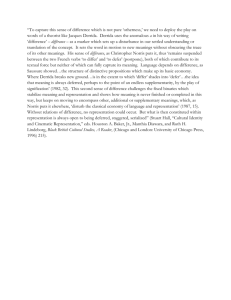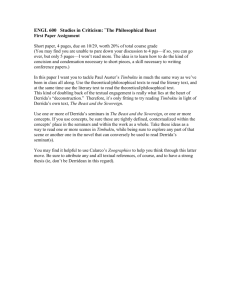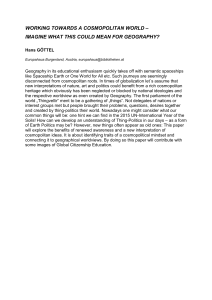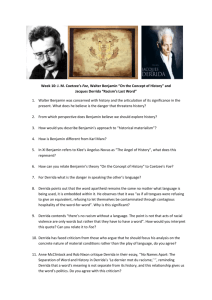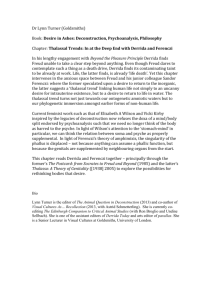Document 12431483
advertisement
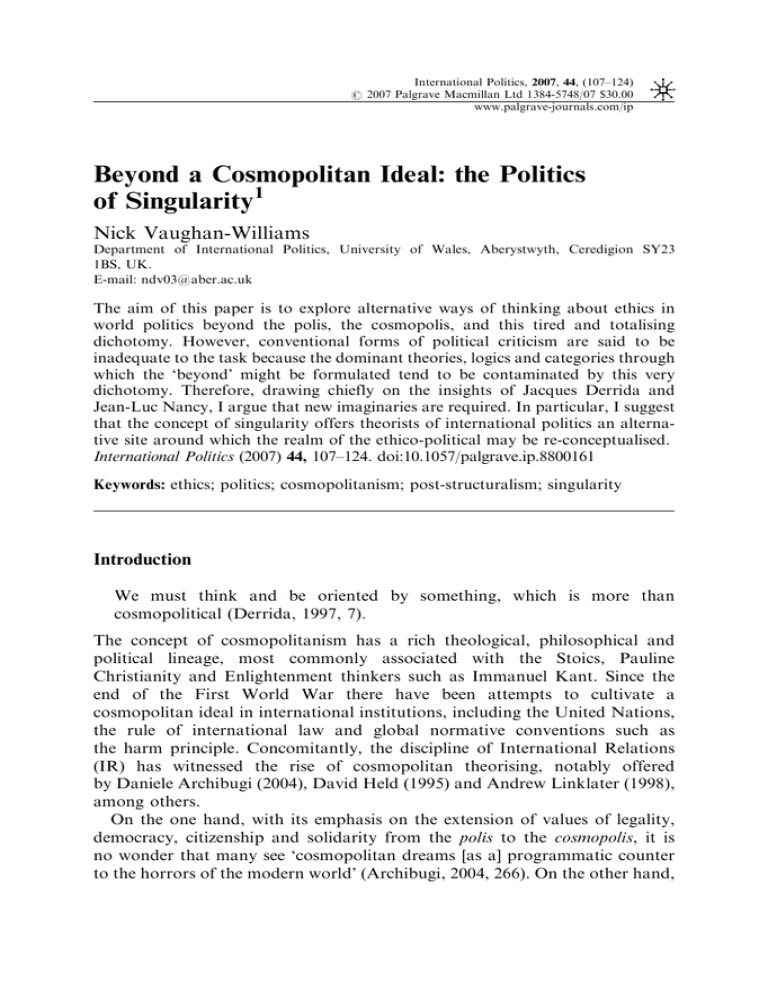
International Politics, 2007, 44, (107–124) r 2007 Palgrave Macmillan Ltd 1384-5748/07 $30.00 www.palgrave-journals.com/ip Beyond a Cosmopolitan Ideal: the Politics of Singularity1 Nick Vaughan-Williams Department of International Politics, University of Wales, Aberystwyth, Ceredigion SY23 1BS, UK. E-mail: ndv03@aber.ac.uk The aim of this paper is to explore alternative ways of thinking about ethics in world politics beyond the polis, the cosmopolis, and this tired and totalising dichotomy. However, conventional forms of political criticism are said to be inadequate to the task because the dominant theories, logics and categories through which the ‘beyond’ might be formulated tend to be contaminated by this very dichotomy. Therefore, drawing chiefly on the insights of Jacques Derrida and Jean-Luc Nancy, I argue that new imaginaries are required. In particular, I suggest that the concept of singularity offers theorists of international politics an alternative site around which the realm of the ethico-political may be re-conceptualised. International Politics (2007) 44, 107–124. doi:10.1057/palgrave.ip.8800161 Keywords: ethics; politics; cosmopolitanism; post-structuralism; singularity Introduction We must think and be oriented by something, which is more than cosmopolitical (Derrida, 1997, 7). The concept of cosmopolitanism has a rich theological, philosophical and political lineage, most commonly associated with the Stoics, Pauline Christianity and Enlightenment thinkers such as Immanuel Kant. Since the end of the First World War there have been attempts to cultivate a cosmopolitan ideal in international institutions, including the United Nations, the rule of international law and global normative conventions such as the harm principle. Concomitantly, the discipline of International Relations (IR) has witnessed the rise of cosmopolitan theorising, notably offered by Daniele Archibugi (2004), David Held (1995) and Andrew Linklater (1998), among others. On the one hand, with its emphasis on the extension of values of legality, democracy, citizenship and solidarity from the polis to the cosmopolis, it is no wonder that many see ‘cosmopolitan dreams [as a] programmatic counter to the horrors of the modern world’ (Archibugi, 2004, 266). On the other hand, Nick Vaughan-Williams Beyond a Cosmopolitan Ideal 108 a growing literature suggests that the materialisation of these dreams beyond the narrow confines of today’s cosmopolitics might constitute an equally problematic horizon. According to RBJ Walker it is the framing of the polis/cosmopolis dichotomy that is flawed, as an expression of the limits of the modern political imagination, rather than either the polis or cosmopolis per se (Walker, 2003, 272). Therefore, any attempt to think beyond cosmopolitanism must be wary of this tired and totalising dichotomy, lest it falls back into the same trap. However, conventional modes of political criticism run into difficulty here, since many of the theories, logics and concepts through which we might formulate the beyond tend to be already contaminated by the dichotomy. In recent years Jacques Derrida, among others, has implied a re-orientation of the realm of the ethico-political based upon the concept of singularity. For Derrida the bond he feels with ‘this particular Algerian who is caught between the FIS and the Algerian state, or this particular Croat, Serbian, or Bosnian, [y] or whoever’ is not one between citizens, political subjects, or human beings (Derrida, 1994, 240–1). Rather, it is a bond between singularities all over the world in protest against political configuration, as such. In this essay, I want to argue that the re-orientation of the realm of the ethico-political around the concept of singularity offers theorists of international relations a means of thinking beyond cosmopolitanism — but without merely reproducing the problematic polis/cosmopolis bind identified above. The argument is divided into three main sections. The first offers a brief history of the concept of cosmopolitanism in order to stress that it is far from a static or homogenous concept. The second then opens up several lines of analysis intended to probe the limits of a cosmopolitan ideal as it has been conventionally understood. The third explicates and evaluates the concept of singularity as entailing something ‘more than’ such an ideal as far as the realm of ethics and politics is concerned (Derrida, 1997, 7). A Cosmopolitan Ideal In his recent book Classical and Modern Thought on International Relations: From Anarchy to Cosmopolis (New York and Hampshire: Palgrave Macmillan, 2005), Robert Jackson characterises cosmopolitanism as: ‘A body of thought, [y] which envisages a world that is progressing some distance beyond a society of states, and is becoming a solidarist community or cosmopolis of humankind, where ethics are truly universal, in the sense of applying to every man and woman on earth’ (Jackson, 2005, x). This venerable body of thought, whose historical trajectory is of course open to dispute, has its roots in Greek Stoicism on the one hand and St Paul in the Christian tradition on the other. International Politics 2007 44 Nick Vaughan-Williams Beyond a Cosmopolitan Ideal 109 The idea of a global unity of human beings as one species living in a world society — together with notions of universal law and harmony — is associated with the work of Zeno who founded the Stoic school in 342 BC. Plutarch’s writings — some four centuries later — give an indication of the main features and popularity of Stoicism as a religion and philosophy before it was later displaced by Christianity: The much admired polity of Zeno, the founder of the Stoic school, is directed to this one main point: our life should not be based on cities or peoples each with its own view of right and wrong, but we should regard all men as fellow-countrymen and there should be one life and one order, like that of a single flock on a common pasture feeding together under a common law (quoted in Carter, 2001, 12). By extending the possibility of citizenship to all men as ‘cosmopolites’ (or ‘citizens of the universe’), Zeno’s teachings contrasted the Aristotelian view of the citizen as first and foremost an active participant in the affairs of the polis. Thus, given its privileging of the law of the world-city over that of the citystate, Stoicism is widely accredited with the foundation of the concept of cosmopolitanism (Dower, 2003, 8). However, early Christianity is commonly seen as a secondary cosmopolitan source, with its emphasis on human equality within a universal Church. In his letter to the Ephesians, who were excluded as gentiles from the commonwealth of Israel, St Paul calls for a certain belonging to the world: ‘Through Christ we have access by one spirit to the Father. You are no longer strangers and foreigners, but fellow citizens with the saints, and members of the household of God’ (Ephesians, 2: 18–20). According to Carter (2001) and Heater (1990), these Christian interpretations of Greco-Roman universalism began to flourish again in Europe during the 13th and 14th centuries, following the medieval period. Yet, by the 17th and 18th centuries, Enlightenment thinkers began to replace the transcendent God behind cosmopolitanism with the transcendence of history, science and the modern subject. Of many Enlightenment cosmopolitans — including Jeremy Bentham, Denis Diderot, David Hume, Tom Paine, Adam Smith and Franc¸ois-Marie Arouet de Voltaire — it is widely accepted that the legacy of Immanuel Kant is the most significant in terms of the cultivation of an enduring cosmopolitan ideal (Fine and Cohen, 2002; Held, 1995; Nussbaum, 1997; Vertovec and Cohen, 2002). Kant fused elements of republicanism and liberalism with a sense of moral universalism obliging individuals to think like citizens of the world. As a moral being each individual has a duty to obey and understand the bonds and principles that unite him or her with other humans. Kant’s theory of morality is summarized by the categorical imperative ‘treat everyone as ends in themselves rather than as a means to an end’ International Politics 2007 44 Nick Vaughan-Williams Beyond a Cosmopolitan Ideal 110 (Kant, 1990, 106). On this view, moral duties are not circumscribed by the borders of political communities, but universally applicable. For Kant, all men have a right to reciprocal hospitality anywhere in the world, ‘by virtue of their right to communal possession of the earth’s surface’ (Kant, 1990, 106). As Hans Reiss explains, Kant’s theory of politics is therefore part of a metaphysics of morality, since ‘the principle of universality demands that our social and political institutions should be governed and our public conflicts settled in a universal manner’ (Reiss, 1990, 20). In turn, this requires the existence of universally valid law, which should govern the realm of the political. The implications of Kant for the theorization of international relations have received much attention (see Hurrell, 1990). He is in fundamental agreement with Hobbes that the state of nature is all against all. But, unlike Hobbes, Kant offers a more optimistic political manifesto. The duty of international relations, as set out in Perpetual Peace, is to work towards a cosmopolitan society. A global state, one that would ‘grow until it embraced all the peoples of the earth’, is preferable. However, since ‘it is not the will of the nations’ Kant argues that ‘the positive idea of a world republic’ is out of the question. Therefore, a negative solution will have to suffice: If all is not to be lost, this can at best find a negative substitute in the shape of an enduring and gradually expanding federation likely to prevent war. The latter may check the current of man’s inclination to defy the law and antagonise his fellows, although there will always be a risk of it bursting forth anew (Kant, 1990, 105). Here, Kant’s primary concern is to show how politics — in keeping with the categorical imperative — may serve moral universalism. Ultimately, this entails movement towards an ethical cosmopolis of a kingdom of ends. In IR Kant has found favour with those theorists who deny the immutability of the states-system. According to Carter (2001) the inspiration of Kantian thought lies on three levels: first, it extends the moral imagination beyond the parochialism of the bordered nation-state; second, it offers views on the relationship between historical developments promoting globalism on the one hand and the role of political praxis on the other; and third, it promotes international institutionalism. These moral, historical, and institutional dimensions are readily found in the work of Andrew Linklater. In The Transformation of Political Community: Ethical Foundations of the Post-Westphalian Era (Cambridge: Polity Press, 1998), Linklater draws on Marx and Kant in order to outline a vision for new forms of trans-national cooperation, beyond the ‘totalising project’ of contemporary statist arrangements. However, wary of the propensity of Enlightenment meta-narratives to stifle difference or Otherness, Linklater International Politics 2007 44 Nick Vaughan-Williams Beyond a Cosmopolitan Ideal 111 supplements the Marxian and Kantian heritage with Habermasian discourse ethics. His over-arching thesis is that by extending the current borders of political community through dialogue it is possible to bring marginal voices to bear in decision-making processes. In this context, new forms of political authority and citizenship are envisaged, along lines similar to those advanced by Daniele Archibugi and David Held (Archibugi and Held, 1995). These advocates of a global cosmopolitan democratic order attempt to apply principles of democracy historically contained within the nation-state to international relations more generally: ‘For such problems as the protection of the environment, the regulation of migration and the use of natural resources to be subjected to necessary democratic control, democracy must transcend the borders of single states and assert itself on a global level’ (Archibugi, 2004, 7). Yet, it must be emphasised, the arguments of Archibugi, Held and Linklater do not simply presuppose the dissolution of the current states-system into one world state. Rather, adapting Kant, the call is for the rise of a global civil society or a ‘universal system of cosmo-political governance’, which would ultimately undermine the nation-state as the ‘sole centre of legitimate power within [its] own borders’ (Held, 1995, 233). On the one hand, as Steven Vertovec and Robin Cohen have pointed out, there is no gainsaying that Kant has had a lasting influence on cosmopolitan theorising (Vertovec and Cohen, 2002, 8–9). On the other hand, however, it would be churlish to conflate all notions of cosmopolitanism with Kantianism per se. Linklater is not the only contemporary cosmopolitan theorist to mediate his engagement with Kantian thought. For instance Held has long argued that Kant’s articulation of the cosmopolitan ideal is no longer adequate to the task of democratisation under globalising world order (see Held, 1995, 1997). However, as Robert Fine and Robin Cohen have recently claimed, most criticism of Kantian cosmopolitanism has consisted of ‘merely of ironing out inconsistencies in his theory and of adapting his theory to modern conditions’, rather than offering a more substantive critique (Fine and Cohen, 2002, 140). Seizing on this complaint the next section begins by probing the limits of the Kantian cosmopolitical ideal further in terms of three areas of perceived weakness: first, a teleological view of history; second, a Eurocentrism masquerading as universalism; and third, a continued reliance on the sovereignty of the nation-state. I argue that despite some contemporary cosmopolitan theorists’ attempts to address aspects of these weaknesses in Kant their own work often reveals a series of more general problems with cosmopolitanism as an ideal. And so it is on this basis that another perspective on the realm of the ethico-political — beyond a cosmopolitan ideal — is ultimately called for. International Politics 2007 44 Nick Vaughan-Williams Beyond a Cosmopolitan Ideal 112 The Limits of a Cosmopolitan Ideal The rise of inter-related discourses of international human rights, humanitarian intervention, and globalisation appears to have revived interest in the concept of cosmopolitanism in IR. However, as Walker puts it, ‘in some very important respects cosmopolitanism must be read as a constitutive aspect of the problems that many of those attracted to cosmopolitanism seek to address’ (Walker, 2003, 268). In support of Walker’s point I now want to identify and explore ways in which both Kant’s cosmopolitan ideal and many contemporary adaptations of it constitute a far more limited paradigm within which it is possible to think about ethical and political issues in world politics than we are usually led to believe. First, underpinning Kantian cosmopolitanism is a highly troublesome teleology, which can be said to view history as ‘one giant trek from the polis to the cosmopolis’ (Walker, 2003, 269). For example, in his essay ‘The Idea of a Universal History from the Cosmopolitan Point of View’ (1784), Kant writes: ‘After many revolutions, with all their transforming effects, the highest purpose of nature, a universal cosmopolitan existence, will at last be realized as the matrix within which all the original capacities of the human race may develop’ (Kant, 1990, 51). On this basis Kant’s philosophical approach to universal history is predicated on a view of nature as a plan aiming for total, perfect, political unification of the human species. The logic of this teleology, as Derrida has noted, is that: ‘We must be grateful to nature [y] for having made us naturally, originally so unsociable and so un-philosophical that we are driven by culture, art, and artifice, as well as by reason to bring to fruition the seeds of nature’ (Derrida, 2002a, 335). Moreover, as Fine and Cohen argue, it is a logic that discerns progress towards perpetual peace as though it were taking place ‘behind the backs or over the heads’ of political subjects (Fine and Cohen, 2002, 142). Both Derrida, and Cohen and Fine thus point to the way in which Kant’s treatment of history, as if it were to lead inevitably towards the emergence of a cosmopolitical legal order, leaves little or no room for politics or the active shaping of political life as such. One does not have to look very far to see instances of this de-politicized metaphysical conceit creeping into contemporary cosmopolitan accounts of international relations. In this regard, the subtitle of Jackson’s book referred to earlier — From Anarchy to Cosmopolis — is perhaps telling. To some extent it might be argued in defence of contemporary cosmopolitan perspectives that many writers deliberately try to escape this charge. Held, for example, would seem to approach the achievement of a cosmopolitan legal order as a normative goal to be fought for politically rather than as a natural outcome. Hence, as I will later examine, much of Held’s work involves the active setting-out of a new agenda for the International Politics 2007 44 Nick Vaughan-Williams Beyond a Cosmopolitan Ideal 113 creation — as opposed to the mere facilitation — of a new global cosmopolitan democratic order (Held, 1997). Nevertheless, this raises a related point about whether or not this sort of agenda-setting in some sense always prematurely closes off the scope or frame of politics in the future: a key issue to which I will return. Second, despite the cosmopolitanism of its spirit, the teleological view of universal history underpinning the Kantian ideal is itself grounded specifically in Greco-Roman, Christian, and therefore Western/European thought. Kant’s narrative of the unfolding of nature leading to the victory of reason that in turn leads to the emergence of a society of nations cannot be read outside the context of modernity and European colonialism. Hence, Couze Venn writes: ‘The cosmopolitan dream of the Enlightenment [y] unites a narrative of progress, construed in terms of the victory of reason, with a universal history of the human species, refigured as the teleological destiny of Europe’ (Venn, 2002, 75). In the IR literature, most advocates of cosmopolitanism usually go to great lengths in order to insist that they do not conflate universalism with Euro-centrism. In their joint paper ‘Problems of Global Democracy: A Dialogue’, presented at the workshop from which the current special issue derives, Heikki Patomäki challenges David Held on this very point. Held plays down his European perspective declaring: ‘I have never set the EU as the model for the whole world’ (Held and Patomäki, 2005, 7). However, to the extent that Held sees Europe as a ‘peace [and] extraordinary sovereignty laboratory’ from which ‘many regions of the world can learn’, his perspective nevertheless implies a logic of progress where non-Europeans continue to trail behind. Linklater offers a seemingly robust avoidance of the charge of Euro-centrism in his The Transformation of Political Community by drawing on Habermasian discourse ethics. Yet, as Derrida shows in The Other Heading (1992), it could be argued that such a move falls back into the very trap it purports to escape from. Derrida’s worry is that the discourse ethics model ‘tends to suspect or repress anything that bends, over-determines, or even questions, in theory or practice, this idea of language’ (Derrida, 1992, 54–5). On the Derridean view the Habermasian perspective runs the risk of constituting yet another centralising European hegemony. This ‘new form of cultural takeover’ is problematic precisely because it presupposes an origin in which the reason of the universal conditions of autonomy and social solidarity are validated by communication, inter-subjectivity and consensus. The crux of Derrida’s fear is that, despite claiming to speak ‘in the name of intelligibility, good sense, common sense’, the dialogic ethic is geared towards consensus rather than the possibility of unending contestation (Derrida, 1992, 54–5). And ultimately this constitutes nothing more than the imposition of a particular cultural norm. International Politics 2007 44 Nick Vaughan-Williams Beyond a Cosmopolitan Ideal 114 Third, despite Held’s insistence that contemporary Europeans ‘live in a cosmopolitan world of multiple, over-lapping political associations, multilayered authority and multiple citizenships’ (Held and Patomäki, 2005, 7), there are grounds for questioning whether a cosmopolitan ideal has ever represented anything other than a reification of the state. Although it is neither possible nor desirable to reduce cosmopolitanism to any particular concept or characteristic, Derrida has identified the importance of the notion of hospitality it entails, running throughout the Stoic, Christian and Kantian traditions discussed earlier. Cosmopolitics, on this view, is closely associated with a series of questions relating to the rights of the foreigner, immigrant, exiled, deported, stateless or displaced person. As we have already seen, in his Universal History from a Cosmopolitan Point of View, Kant appears to extend cosmopolitan law to encompass universal hospitality without limit on account of communal possession of the earth’s surface. However, in Perpetual Peace, Kant tempers this by stipulating: ‘the law of cosmopolitanism must be restricted to the conditions of universal hospitality’. In a number of recent texts, Derrida has reflected upon the significance of this conditional form of hospitality. He stresses that Kant puts various limitations on the hospitality extended to foreigners: first, the right to universal hospitality is a right of visitation not residence; second, the right to universal hospitality only applies to citizens as such; and third, the right to universal hospitality as a law is ultimately still dependent on and controlled by the state and its police (Derrida, 2002b, 22). In other words, it is precisely the nation-state, rather than any other political entity, that defines and enforces laws concerning who is welcomed or not. Thus, while Derrida has the ‘greatest respect’ for Kant’s formulation of the cosmopolitan ideal, he argues that it constitutes a highly limited paradigm in which state sovereignty remains intact: ‘The law and cosmopolitics of hospitality that [Kant] proposes [y] is a set of rules and contracts, an interstate conditionality that limits, against the backdrop of natural law reinterpreted within a Christian horizon, the very hospitality it guarantees’ (Derrida, 1999, 101, emphasis added). That Kant’s formulation of the cosmopolitan ideal constitutes a limited paradigm has not gone un-noticed among contemporary cosmopolitan writers. For example Held writes: While Kant’s [y] arguments for universal hospitality are noteworthy, they do not elaborate adequately the conditions of such hospitality; without conceiving of cosmopolitan law as cosmopolitan democratic law, the conditions for the protection of freedom and autonomy for each and all cannot be satisfactorily envisaged (Held, 1997, 244). Over the past decade Held has responded to this perceived inadequacy within the Kantian paradigm by setting out a new agenda for greater universal International Politics 2007 44 Nick Vaughan-Williams Beyond a Cosmopolitan Ideal 115 hospitality along global cosmopolitan democratic lines. In the short-term this includes: the reform of the UN Security Council; the creation of a second chamber in the UN; the enhancement of political regionalisation; the use of trans-national referenda; the creation of a new Human Rights Court; the foundation of a new co-ordinating economic agency at regional and global levels; and the establishment of a new effective, accountable, international military force (Archibugi and Held, 1995; Held, 1995, 1997). In the longer term Held proposes: the entrenchment of cosmopolitan democratic law in a new Charter of Rights; the inauguration of a new Global Parliament connected to regions, nations, and localities; a new interconnected global legal system; the separation of political and economic interests through public funding of deliberative assemblies and electoral processes; and the formation of new international and trans-national economic agencies to parliaments and assemblies at regional and global levels (Archibugi and Held, 1995; Held, 1995,1997). However, it is important to remember that in one very important respect Held’s argument does not move beyond Kant’s: the state continues to remain at the heart of his conceptualisation of the realm of the ethico-political — albeit in a modified context of global cosmo-political governance. It is not difficult to see how this is problematic since it is precisely the state that produces the foreigner, immigrant, exiled, deported, or state-less person in need of greater levels of universal hospitality in the first place. Thus, Derrida advocates a more radical approach to thinking about ethics and politics, in response to the sans papiers who ‘call out for another international law, another border politics, another humanitarian politics, indeed a humanitarian commitment that effectively operates beyond the interests of the Nation-State’ (Derrida, 1999, 101, emphasis added). Beyond a Cosmopolitan Ideal? The aim of this section is to explore Derrida’s recent attempts at re-conceptualising ethics and politics away from the polis, the cosmopolis, and the polis/cosmopolis dichotomy itself towards what I want to call a ‘politics of singularity’. It is divided into three sub-sections. The first offers a discussion of two key aspects of Derrida’s re-thinking of ethico-political relationality touched upon in my introduction: the concept of singularity; and the idea of a bond between singularities. The second then goes on to show how a Derridean understanding of global ethico-political relations renders a cosmopolitan ideal, as a general programme designed to extend hospitality, inadequate to its own task. The third moves to an examination of how Derrida suggests an alternative way of thinking ethics and politics beyond this ideal. International Politics 2007 44 Nick Vaughan-Williams Beyond a Cosmopolitan Ideal 116 Bonds Between Singularities Instead of basing an understanding of ethico-political relations on a particular human essence — as not only Kant but contemporary cosmopolitan discourses within international relations tend to do — Derrida opts for a more relational view of subjectivity. What makes him feel alongside those caught up in conflict, famine, or other disastrous circumstances is a bond in excess of notions of common citizenship, as if we were all cosmopolitan citizens of the world (Derrida, 1994, 240). Rather, the bond Derrida feels ‘cannot be contained within the traditional concepts of community, obligation, or responsibility’, since these are often wound-up with the very forces behind those circumstances producing disaster in the first place (Derrida, 1994, 240). This bond relates to the ‘the incalculable singularity of everyone, before any ‘subject’ [y] beyond all citizenship, beyond every ‘state’, every ‘people’, indeed even beyond the current state of the definition of a living being as a living ‘human’ being’ (Derrida, 2003, 120, emphasis added). Before analysing the bond between singularities to which Derrida refers it is first necessary to consider what he means by ‘singularity’. As the quotations above indicate, the term singularity is not synonymous with ‘citizen’, or ‘political subject’, or even ‘human’. Instead, Derrida opens up the possibility of conceiving ethico-political relations between all forms of life, irrespective of conventional distinctions such as citizen/non-citizen, human/animal, and so on. Such categorisations are far from somehow stable, natural or neutral. Indeed, as Derrida has long argued, these are political questions that often involve a spurious logic. For example, the human/animal separation is often sustained by the relegation of so-called sub-humans (such as those on permanent life-support machines) to a biological species apart from the ‘human’. By contrast, Derrida refers to a regime of difference, in order to try to remain faithful to the irreducibly singular qualities of forms of life (Derrida and Roudinesco, 2004, 66). This would seem to involve erasing stubborn borders that currently exist between forms of life by insisting on the drawing of even more borders to attempt to attend to the singular in every context. However, Derrida identifies an aporia here, relating to the very concept of singularity: an aporia that actually conditions the concept as such. For singularities to be genuinely singular they cannot be described as anything else that would compromise their singularity. Yet, as soon as any given singularity is identified as a singularity, it has to be, even in a very minimal way, like something — or indeed everything — else. Hence, as Alex Thomson remarks, ‘the condition of being a singularity depends on not being purely or absolutely singular [y]. Were there to be anything absolutely singular it would be un-recognisable’ (Thomson, 2005, 24). If this is the case, we might ask, how is it even possible to talk about singularity International Politics 2007 44 Nick Vaughan-Williams Beyond a Cosmopolitan Ideal 117 or indeed a bond between singularities? Jean-Luc Nancy’s essay ‘being singular plural’ offers some help. Nancy points out that the term ‘singular’ in Latin – singuli – already announces its plurality. He explains: ‘The singular is primarily each one and, therefore, also with and among all the others. The singular is a plural’ (Nancy, 2000, 32). At first this may seem paradoxical. However, Nancy’s point is that notions of singularity and plurality are not opposites, but rather codeterminates of each other. In other words, it only makes sense to refer to the singular in the context of the plural, and vice versa. Each singularity is always an-other in a plurality of being-with others. Here, the key point is that being can only refer to being-with-one-another, in terms of being-in-common. For Nancy, that which exists always already co-exists, ‘the world is the co-existence that puts these existences together’ (Nancy, 2000, 29). Hence, singularity does not make sense unless it is seen with or in relation to the other singularities that make it singular. On this basis, Derrida’s bond refers to something like an alliance arising from the plurality of singularities that makes singularity (im)possible. It can be considered in terms of Nancy’s use of the word ‘with’ above: ‘singulars singularly together, where the togetherness is neither the sum, nor the incorporation, nor the ‘society’, nor the ‘community’’ (Nancy, 2000, 33). Such an ontology of ‘being-with’ is an ontology of bodies — ‘of every body, whether they be inanimate, animate, sentient, speaking, thinking, having weight, and so on’ (Nancy, 2000, 83). Thus, in many ways, the bond between singularities is less abstract than it might appear at first. Indeed, it is precisely this ‘being-with’ that gives rise to concrete situations in which decision-making, responsibility, and other aspects of the realm of the ethico-political arise. On the one hand, it may be objected that the conceptualization of bonds between singularities merely hankers after the very forms of subjectivity both Derrida and Nancy wish to overcome.2 This objection is worthy of serious consideration. To reiterate an earlier point, Derrida claims that the bond he feels with others is at a level ‘where they are not yet defined by citizenship [y] that is, by their condition as lawful ‘subjects’ in a state [y]’ (Derrida, 2003, 130, emphasis added). It could be argued that the notion of a subject-less position before citizenship or political configuration as such is as equally chimerical as the Kantian position uniting individual humans as universal moral beings. Of course, this line of critique may be extended to Nancy as well as Derrida, especially in light of comments such as ‘being-many-together is the originary situation’ (Nancy, 2000, 41, emphasis added) and ‘from the very beginning [y] ‘we’ are with one another [y] as a being-with-one-another’ (Nancy, 2000, 96, emphasis added). If this critique were to stand then the concept of singularity would singularly fail in its attempt to think ethicopolitical relationality beyond the type associated with Kant. International Politics 2007 44 Nick Vaughan-Williams Beyond a Cosmopolitan Ideal 118 On the other hand, however, it is certainly possible to defend Derrida and Nancy from these charges. For Derrida, the relation to the Other guides everything concerning the bond between singularities. In this sense, as we have already seen, singularity refers to that which is radically Other, irreducible simply to concepts of ‘citizen’, or ‘human’ and so on. Rather, Derrida stresses, the relation to the Other as a singularity is a relation to an ‘absolute surprise’ (Derrida, 1994, 242). Thus, as far as Derrida is concerned, bonds between singularities are ‘spectral’, since they are always in a state of invention. This is the nub of the defence. For the infinite openness associated with the concept of singularity marks a radical departure from the traditional quest for a specifically human subject. Such a quest is ultimately for closure whereas both Derrida and Nancy stress the impossibility of this. Here, they are both in agreement with Elizabeth Roudinesco, who usefully captures the over-arching point very succinctly: ‘singularity [y], even when deconstructed, exists and resists every form of a priori construction’ (Derrida and Roudinesco, 2004, 99). Having introduced the bond between singularities that frames Derrida’s approach to ethico-political relations it is now possible to show how his perspective renders a cosmopolitan ideal problematic as an ideal. The Economy of Violence in an Ethical Generality The animating force of a cosmopolitan ideal — whether Stoic, Christian, or Kantian — concerns the extension of hospitality to others. Moreover, this force continues to underpin many contemporary articulations of the ideal, as the work of David Held suggests. For Held the adaptation and extension of Kant’s conditional hospitality ‘must comprise mutual acknowledgement of, and respect for, the equal and legitimate rights of others to pursue their own projects and life plans’ (Held, 1997, 244). Yet, for Derrida, it is precisely the impossibility of being able to assure or guarantee the ‘mutual acknowledgement of, and respect for, the equal and legitimate rights of others’ that highlights a limit within any agenda or programme that seeks to extend hospitality in such a way. This is not to say that Derrida condemns approaches that aim to extend hospitality for seeking to do so. On the contrary, Derrida closely connects deconstruction with hospitality. Rather, Derrida identifies what might be called a structural impediment to the extension of hospitality in this way, which demands closer attention. Any agenda or programme designed to extend hospitality to others constitutes an attempt to provide an ethical generality in world politics that is doomed to failure. As soon as a course of action is taken to try to assure or guarantee the ‘equal and legitimate rights of others’, as Held advocates, some others somewhere else in the world are always betrayed. To put it differently, it is only ever possible to extend hospitality to the other while at the same time, International Politics 2007 44 Nick Vaughan-Williams Beyond a Cosmopolitan Ideal 119 scandalously and paradoxically, sacrificing all the others to whom it is also necessary to respond. Thus, in responding to ‘this particular Algerian who is caught between the FIS and the Algerian state, or this particular Croat, Serbian, or Bosnian, [y] or whoever’ as a singularity, it is necessary to sacrifice ethics as such: ‘what binds me to singularities, to this one or that one, male or female, rather than that one or this one, remains finally unjustifiable [y] as the infinite sacrifice I make at each moment’ (Derrida, 1995, 71). According to Derrida this is the central paradox of the realm of the ethico-political. Yet, as with many of Derrida’s analyses, it is precisely this paradox that is said to condition the possibility for ethics and politics in the first place. Without an infinitude of responsibility to others as singularities, to ‘every (one) as every (bit) other’, there would be no ethical problems, such as who to help in this or that emergency, who to give aid to, or who to extend hospitality to, in the face of competing needs (Derrida, 1995, 68). Neither would there be any need for political questioning of the ways in which these ethical problems are tackled. Hence, a programmatic approach to the ethical in world politics — such as one based upon a cosmopolitan ideal — always entails an economy of violence, which Derrida urges extreme vigilance toward. Derrida’s identification of the economy of violence at the heart of an ethical generality calls into question whether thinking about ethics and politics in an expansive way — as a cosmopolitan ideal generally entails — is desirable or indeed possible. The pressing task is to think about how to respond to the structural impediment to our ability to act responsibly to every other as a singularity. Such a task calls for a perspective on ethics in world politics that does not merely wash its hands of the economy of violence — as cosmopolitan approaches necessarily do — but one that marks and tries to come to terms with it. The answer formulated in Derrida’s more recent work, as Alex Thomson has noted, is a relocation of ethics — the question of what we should do in any given situation — to politics (Thomson, 2005, 67). This is what I call a ‘politics of singularity’. The Politics of Singularity On the one hand, Derrida’s work does not provide an ethics as such, understood in terms of a set of ideals, principles, or norms about what should happen in the future. On the other hand, based around the concept of singularity, Derrida’s work does offer a positive way of approaching ethical issues or problems in world politics. This may come as something of a surprise to those critics of deconstruction who have long cast it aside as somehow nihilistic. Derrida’s attempt to grapple with the political implications of the economy of violence associated with an ethical generality is summed up in his notion of International Politics 2007 44 Nick Vaughan-Williams Beyond a Cosmopolitan Ideal 120 the ‘democracy to come’. This notion, as I have argued elsewhere (VaughanWilliams, 2005, 175), acts as a pragmatic signifier, or nickname, for the possibility of political arrangements beyond the polis, the cosmopolis, and the polis/cosmopolis dichotomy. Yet, it does not simply refer to a democracy we might imagine at some point in the future, such as that articulated by contemporary advocates of ‘cosmopolitan democracy’ (Archibugi and Held, 1995). Rather, it relates to a democratic order outside the parameters of the classical model, as defined and developed historically in the West. Hence, Derrida writes: What I call ‘democracy to come’ would go beyond the limits of cosmopolitanism [y]. It would be more in line with what lets singular beings [y] ‘live together’, there where they are not yet defined by [y] their condition as lawful ‘subjects’ in a state or a legitimate members of a nationstate or even a confederation or world state. It would involve, in short, an alliance that goes beyond the ‘political’ as it has commonly been defined (Derrida, 2003, 130–1, emphasis added). According to Derrida, the promise of a democracy to come is immanent within the concept of democracy itself. At the heart of this concept is said to be a constitutive flaw. On the one hand, democracy respects the citizen or political subject as an absolute singularity, in other words a singular to be counted. On the other hand, there is no democracy without calculated majorities, which necessarily efface the singularity of the countable. Derrida argues it is precisely the impossibility of resolving this bind — of both adequately taking into account the equality of everyone and the incalculable singularity of every-one — that means democracy ‘welcomes the possibility of being contested, of contesting itself, of criticising and indefinitely improving itself’ (Derrida, 2003, 121). As a promise, the concept of the democracy to come is not something readily translatable into a conventional political order as such. Rather, it is best conceived of as an endless quest for improvement or reform of so-called democratic institutions and processes that necessarily fail to live up to the democratic ideal. As such, with the emphasis on the to come, Derrida’s is far from some sort of lazy horizon in which there is no place for political action. On the contrary, the concept of democracy to come implies a duty to act without delay, in keeping with the possibility of endless contestation and perfectibility already inscribed in the concept of democracy. It calls for the perpetual deconstruction of existing social, political, economic and legal institutions. Such an approach resembles something like an everyday revolution. On this basis the notion of a democracy to come can be interpreted as an attempt to harness and grapple with — rather than ignore and put to one International Politics 2007 44 Nick Vaughan-Williams Beyond a Cosmopolitan Ideal 121 side — a certain politics of singularity. Derrida takes as his starting point the problem of the economy of violence when dealing with singularities in the ethico-political realm. No ethical generality, such as that represented by a cosmopolitan ideal, escapes the paradox that in responding to some singularities some Other singularities are sacrificed somewhere else. And yet, unless we are to sit back and do nothing, the sacrifice of ethics in this way is an unavoidable activity. It is, moreover, one that happens on a daily basis. Indeed, as Derrida writes, ‘not only is it true that [y] society participates in this incalculable sacrifice, it actually organises it. The smooth functioning of its moral discourse and good conscience presupposes the permanent operation of this sacrifice’ (Derrida, 1995, 86). On this basis it is necessary to expose and interrogate the multifarious ways in which hospitality is extended to some singularities but not others. As hospitality is political — it operates on the basis of an exclusionary logic — a cosmopolitan ideal howsoever formulated will always fall foul of its own general ethical agenda. Indeed, even if hospitality were successfully extended to all humans, it would still remain caught up in a politics of singularity, since a political border would be drawn between what is considered human and what is considered sub or inhuman. Rather than ignore this central paradox, as any general notion of ethics must do, Derrida calls for a teasing out of the operations of the politics of singularity. His notion of a democracy to come, without constituting a programme or agenda as such, entails this in its quest for unceasing questioning of political praxis. Such a questioning is in the name of the bond between singularities to which Derrida refers. Conclusions Despite the propensity to equate cosmopolitanism with grand gestures of inclusion, hospitality and an alternative imaginary to the parochialism of the modern nation-state, this ancient ideal is in many ways a highly limited paradigm. The cosmopolis emerges as less of a correction to the polis and more its historic bedfellow complicit in a host of exclusionary practices presumably most cosmopolitans would like to overcome. This article has sought to explore alternative means of thinking ethicopolitical relations beyond the tired and totalising dichotomy set-up by the polis/cosmopolis. In doing so its central argument is that the concept of singularity, as advanced in recent works by French philosophers Jacques Derrida and Jean-Luc Nancy, offers an alternative site around which this relationality might be considered. By paying attention to the singular Derrida and Nancy are advocating a radically new approach to the way we think about ethico-political imperatives International Politics 2007 44 Nick Vaughan-Williams Beyond a Cosmopolitan Ideal 122 in world politics. As such their argument is a significant rebuttal to those critics of so-called ‘post-structuralism’ who continue to deny that this heterogeneous body of thought has anything positive to say about ethics and politics. A common tendency under conditions of globalisation, as Paul Valéry has acutely remarked, is for conceptions of the ethico-political to resemble the stock market. In this regard, Jerome Bindé comments: ‘There is no longer any fixed standard of value, any stable and absolute measure, but rather all values fluctuate in a vast market, their quotations rising and falling according to wholly subjective crazes, panics, and wagers’ (Bindé, 2004, xii). Such relativism is often associated with the likes of Derrida and Nancy. However, revolving around the concept of singularity, this is anything but a true reflection of their position. For example, in direct contrast with the trend outlined by Valéry and Bindé, Nancy writes: ‘There is a common measure, which is not some one unique standard applied to everyone and everything. It is the commensurability of incommensurable singularities, the equality of all the origins-of-the-world, which, as origins, are strictly unexchangable’ (Nancy, 2000, 75). In the same vein, Derrida emphasises that his work on the ethico-political is not nihilistic or even rooted in some sort of Rorty-esque pragmatism: ‘There is one principle [y] one must take account of the singularity of the context and the moment’ (Derrida and Roudinesco, 2004, 99). The implications of the concept of singularity for theorists of international relations, perhaps especially those who have shown predilections for the cosmopolitan ideal, are significant. However, sensitivity to singularity is not necessarily something we can readily talk about in terms of operationalization, as if it were a new political programme. On the contrary, as B.C. Hutchens asserts, sensitivity to singularity enjoins a rejection of an ‘expansive ideological vision’ implied by the desire to think about ethics and politics as an ‘operation’ (Hutchens, 2005, 22). Rather, attention to singularity calls for radical attention to the specificities of singularities. Such an approach seeks to avoid technologized or rulegoverned responses to the complexities of particular situations at all costs. Hence, in the name of a certain ‘principle of singularity’, Derrida argues in relation to the concrete issue of humanitarian intervention: ‘I will not make the same decision at different moments. I might be opposed to a particular humanitarian operation in one case, and I might support it in another’ (Derrida and Roudinesco, 2004, 99). This attitude calls for vigilant negotiation with what I have called a ‘politics of singularity’. Above all else Derrida and Nancy warn against ethico-political intervention as if it were like pressing buttons on a machine. Despite the sheer impossibility of completely grasping singularity, given its characteristic groundlessness and uncertainty, the upshot of the argument presented here is that we must International Politics 2007 44 Nick Vaughan-Williams Beyond a Cosmopolitan Ideal 123 nevertheless try. Ultimately, as Derrida insists, ‘there is nothing relativistic or opportunistic in this’ (Derrida and Roudinesco, 2004, 99). Notes 1 This paper develops previous work presented at the CSGR ‘Ethics in World Politics: Cosmopolitanism and Beyond?’ workshop, Department of Politics and International Studies, University of Warwick, 24 May 2005. Thanks are due to James Brassett, Dan Bulley, Jenny Edkins, Cian O’Driscoll, Hidemi Suganami and two anonymous readers, for their extensive and thoughtful written comments. Any remaining errors are my own. 2 Thanks to Kimberly Hutchings for raising this point to my attention. References Archibugi, D. (ed.) (2004) Debating Cosmopolitics, London and New York: Verso. Archibugi, D. and Held, D. (eds.) (1995) Cosmopolitan Democracy: An Agenda for a New World Order, Cambridge: Polity Press. Bindé, J. (ed.) (2004) The Future of Values: 21st Century Talks, New York, Oxford, and Paris: Berghahn Books and UNESCO Publishing. Carter, A. (2001) The Political Theory of Global Citizenship, London and New York: Routledge. Derrida, J. (1992) The Other Heading: Reflections on Today’s Europe, Bloomington and Indianapolis: Indiana University Press. Derrida, J. (1994) ‘Nietzsche and the Machine: An Interview with Jacques Derrida by Richard Beardsworth’, Journal of Nietzsche Studies 7: 7–66. Derrida, J. (1995) The Gift of Death,, Chicago and London: The University of Chicago Press. Derrida, J. (1997) ‘Politics and Friendship: a Discussion with Jacques Derrida’, in G. Bennington (ed.) Centre for Modern French Thought, University of Sussex, available at http://www.sussex. ac.uk/Units/frenchthought/derrida.htm. Derrida, J. (1999) Adieu: To Emmanuel Levinas, California: Stanford University Press. Derrida, J. (2002a) Negotiations: Interviews and Interventions, California: Stanford University Press. Derrida, J. (2002b) On Cosmopolitanism and Forgiveness, Padstow: Routledge. Derrida, J. (2003) ‘Autoimmunity: Real and Symbolic Suicides. A Dialogue with Jacques Derrida’, in G. Borradori (ed.) Philosophy in a Time of Terror: Dialogues with Jürgen Habermas and Jacques Derrida, Chicago and London: University of Chicago Press. Derrida, J. and Roudinesco, E. (2004) For What TomorrowyA Dialogue, California: Stanford University Press. Dower, N. (2003) An Introduction to Global Citizenship, Edinburgh: Edinburgh University Press. Fine, R. and Cohen, R. (2002) ‘Four Cosmopolitan Moments’, in Vertovec, S. and Cohen, R. (eds.) Conceiving Cosmopolitanism: Theory, Context, and Practice, Oxford: Oxford University Press. Heater, D. (1990) Citizenship: The Civic Ideal in World History, Politics and Education, London and New York: Longman. Held, D. (1995) Democracy and the Global Order: From the Modern State to Cosmopolitan Governance, Cambridge: Polity Press. Held, D. (1997) ‘Cosmopolitan Democracy and the Global Order: A New Agenda’, in J. Bohman and M. Lutz-Bachmann (eds.) Perpetual Peace: Essays on Kant’s Cosmopolitan Ideal, Cambridge, MA, and London: The MIT Press. International Politics 2007 44 Nick Vaughan-Williams Beyond a Cosmopolitan Ideal 124 Held, D. and Patomäki, H. (2005) ‘Problems of Global Democracy: A Dialogue’, Paper Presented at the ‘Ethics in World Politics: Cosmopolitanism and Beyond?’ Workshop, University of Warwick, 24 May, 2005. Hurrell, A. (1990) ‘Kant and the Kantian Paradigm in International Relations’, Review of International Studies 16: 183–205. Hutchens, B.C. (2005) Jean-Luc Nancy and the Future of Philosophy, Chesham: Acumen Publishing. Jackson, R. (2005) Classical and Modern Thought on International Relations: From Anarchy to Cosmopolis, Hampshire and New York: Palgrave Macmillan. Kant, I. (1990) Political Writings, 2nd Edn, H. Reiss (ed.), Cambridge: Polity Press. Linklater, A. (1998) The Transformation of Political Community: Ethical Foundations of the Post-Westphalian Era, Cambridge: Polity Press. Nancy, J.-L. (2000) Being Singular Plural, California: Stanford University Press. Nussbaum, M. (1997) ‘Kant and Cosmopolitanism’, in J. Bohman and M. Lutz-Bachmann (eds.) Perpetual Peace: Essays on Kant’s Cosmopolitan Ideal, Cambridge, MA, and London: The MIT Press. Reiss, H. (1990) Kant: Political Writings, Cambridge: Polity Press. Thomson, A. (2005) Deconstruction and Democracy: Derrida’s Politics of Friendship, London and New York: Continuum. Vaughan-Williams, N. (2005) ‘Protesting Against Citizenship’, Citizenship Studies 9(2): 167–179. Venn, C. (2002) ‘Altered States: Post-Enlightenment Cosmopolitanism and Transmodern Socialities’, Theory, Culture, and Society 19(1–2): 65–80. Vertovec, S. and Cohen, R. (2002) Conceiving Cosmopolitanism: Theory, Context, and Practice, Oxford: Oxford University Press. Walker, R.B.J. (2003) ‘Polis, Cosmopolis, Politics’, Alternatives 28: 267–286. International Politics 2007 44
